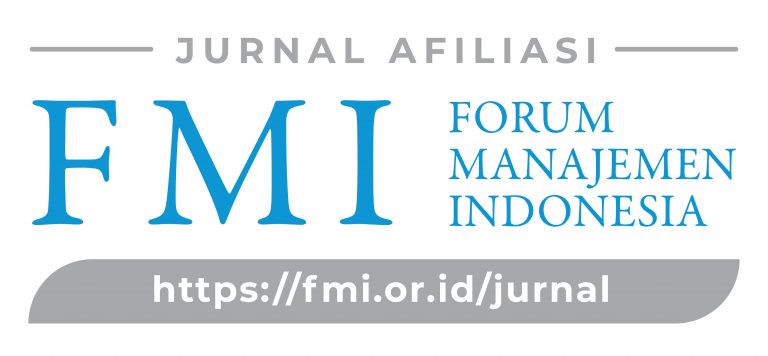The Role of Brand Equity in Mediating the Influence of Social Media Communication on Museum Revisit Intention in Jakarta
DOI:
https://doi.org/10.55732/unu.gnk.2024.06.1.7Keywords:
Brand equity, social media communication, revisit intentionAbstract
This research was conducted with the aim of analyzing the influence of social media communication through brand equity on revisit intention at museums in Jakarta. A quantitative approach is used to answer the research problem formulation. The research sample was 220 museum visitors in Jakarta. The data analysis technique was carried out using partial least square analysis using the SmartPLs program. The research results show that social media communication has a significant effect on revisit intention and brand equity is able to mediate the influence of social media community on revisit intention at museums in Jakarta.
References
Abdillah, W., & Hartono, J. (2015). Partial Least Square (PLS) : Alternatif Structural Equation Modelling (SEM) dalam Penelitian Bisnis (1st ed.). ANDI.
Capriotti, P., & Zeler, I. (2023). Analysing effective social media communication in higher education institutions. Humanities and Social Sciences Communications, 10(1). https://doi.org/10.1057/s41599-023-02187-8
Chin, W. (2000). Partial Least Squares For Is Researchers: An Overview And Presentation Of Recent Advances Using The Pls Approach. Proceedings of the 21st International Conference on Information Systems, ICIS 2000.
Dulyadi. (2021). Buku Ajar Metode Penelitian Ilmiah : Metode Penelitian Empiris Model Path Analysis dan Analisis Menggunakan SmartPLS. Yayasan Prima Agus Teknik dan Universitas STEKOM.
Enke, N., & Borchers, N. S. (2019). Social Media Influencers in Strategic Communication: A Conceptual Framework for Strategic Social Media Influencer Communication. International Journal of Strategic Communication, 13(4). https://doi.org/10.1080/1553118X.2019.1620234
Firmansyah, A., Pinandito, A., & Perdanakusuma, A. R. (2017). Analisis Pengaruh Media Sosial terhadap Minat Kunjungan ke Program Masjid Raden Patah Universitas Brawijaya. Jurnal Pengembangan Teknologi Informasi Dan Ilmu Kompute, 1(1).
Masitoh, M. R., Wibowo, H. A., Prihatma, G. T., & Miharja, D. T. (2024). The Influence of Interactivity, Online Customer Reviews, and Trust on Shopee Live Streaming Users’ Impulse buying. GREENOMIKA, 6(1), 41–53. https://doi.org/10.55732/unu.gnk.2024.06.1.5
Memon, M. A., Ramayah, T., Cheah, J. H., Ting, H., Chuah, F., & Cham, T. H. (2021). Pls-Sem Statistical Programs: A Review. Journal of Applied Structural Equation Modeling, 5(1). https://doi.org/10.47263/JASEM.5(1)06
Muawanah, C. C., & Pujianto, W. E. (2024). Innovation Capability Terhadap Kinerja Organisasi: Dynamic Marketing Capability Sebagai Variabel Mediasi. Dialektika : Jurnal Ekonomi Dan Ilmu Sosial, 9(1), 88–101. https://doi.org/10.36636/dialektika.v9i1.3888
Nursyamsiah, R. A., & Setiawan, R. P. (2023). Does place attachment act as a mediating variable that affects revisit intention toward a revitalized park? Alexandria Engineering Journal, 64. https://doi.org/10.1016/j.aej.2022.08.030
Omar, A., Amri, A., & Hasani, M. C. (2021). Pengaruh Social Media, Customer Experience dan Servicescape Terhadap Revisit Intention Pada Objek Wisata Bahari (Studi Kasus pada Pantai Akkarena, Makassar). Torani: J.MFishSci, 26(1).
Omar, Y. A., Amri, A., & Hasani, M. C. (2020). Pengaruh strategi komunikasi media sosial instagram terhadap brand equity, brand attitude, dan purchase intention. Jurnal Manajemen Komunikasi, 4(2). https://doi.org/10.24198/jmk.v4i2.25948
Park, C. I., & Namkung, Y. (2022). The Effects of Instagram Marketing Activities on Customer-Based Brand Equity in the Coffee Industry. Sustainability (Switzerland), 14(3). https://doi.org/10.3390/su14031657
Pekkala, K., & van Zoonen, W. (2022). Work-related social media use: The mediating role of social media communication self-efficacy. European Management Journal, 40(1). https://doi.org/10.1016/j.emj.2021.03.004
Peng, J., Yang, X., Fu, S., & Huan, T. C. (T C. ). (2023). Exploring the influence of tourists’ happiness on revisit intention in the context of Traditional Chinese Medicine cultural tourism. Tourism Management, 94. https://doi.org/10.1016/j.tourman.2022.104647
Pujianto, W. E. (2022). Pengantar Manajemen Era Digital. In Pustaka Aksara. Pustaka Aksara.
Pujianto, W. E., Musyaffah, L., Haromainy, M. M. Al, & Lisdiyanto, A. (2022). Integrated, Marketing Integrated Marketing Communication Pada Daya Tarik Embrio Destinasi Wisata Bahari Melalui Brand Building. Jurnal Iqtisaduna, 8(1). https://doi.org/10.24252/iqtisaduna.v8i1.29593
Ramadian, K. J., Madya, D. P., & Agusta, E. D. (2023). The Effectiveness of Marketing Strategies Through Social Media (Study on Ayam Koplo by Hangry Indonesia). GREENOMIKA, 5(2). https://doi.org/10.55732/unu.gnk.2023.05.2.7
Sakina, F., & Aslami, N. (2022). Pemanfaatan Instagram Sebagai Social Media Marketing Terhadap Brand EquitY. Journal of Social Research, 1(3). https://doi.org/10.55324/josr.v1i3.36
Satriawan, A., Abdillah, Y., & Pangestuti, E. (2022). Analisis Destination Image Terhadap Revisit Intention Melalui Satisfaction Dan Place Attachment: Literature Review. Profit: Jurnal Administrasi Bisnis , 16(1).
Sumarni. (2018). Pengaruh Brand Equity Terhadap Minat Pemanfaatan Kembali Pelayanan pada Instalasi Rawat Inap Rumah Sakit Ibnu Sina Makassar. Indonesian Journal of Hospital Administration, 1(1).
Sunarta, Rochaeti, E., & Yusuf, B. P. (2020). Reputation As Mediation To The Influence Of Brand Equity On Revisit Intention. AGREGAT: Jurnal Ekonomi Dan Bisnis, 4(1), 70–82. https://doi.org/10.22236/agregat_vol4/is1pp70-82
Downloads
Published
Issue
Section
License
Copyright (c) 2024 GREENOMIKA

This work is licensed under a Creative Commons Attribution-NonCommercial 4.0 International License.
Authors who publish with this journal agree to the following terms:
Authors retain copyright and grant the journal right of first publication with the work simultaneously licensed under a Creative Commons Attribution License that allows others to share the work with an acknowledgement of the work's authorship and initial publication in this journal.
Authors are able to enter into separate, additional contractual arrangements for the non-exclusive distribution of the journal's published version of the work (e.g., post it to an institutional repository or publish it in a book), with an acknowledgement of its initial publication in this journal.
Authors are permitted and encouraged to post their work online (e.g., in institutional repositories or on their website) prior to and during the submission process, as it can lead to productive exchanges, as well as earlier and greater citation of published work (See the Effect of Open Access).
















